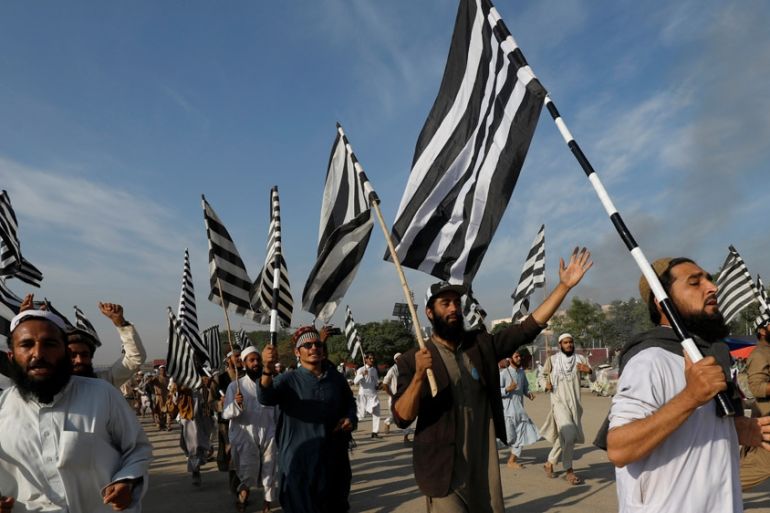Five things to know about Pakistan’s anti-government protests
Protesters led by right-wing party have been camping in the capital since Thursday calling for PM Khan to step down.

Islamabad, Pakistan – Thousands of anti-government protesters, led by Jamiat Ulema-e-Islam Fazi (Jui-F) party leader Fazl-ur-Rehman, have been camped out on a highway in the Pakistani capital since Thursday night, demanding that Prime Minister Imran Khan resign and fresh elections are held.
Khan and his Pakistan Tehreek-e-Insaf (PTI) party-led government have stood firm against the protests, saying that the demonstrators have a constitutional right to protest but that any violation of a pre-protest agreement with the authorities will result in the police taking action.
Keep reading
list of 3 itemsPakistan opposition protesters call on PM Imran Khan to resign
Pakistan PM Khan rejects calls to step down
Here is everything you need to know about the protests.
Why are the demonstrators on the streets?
Khan’s PTI government inherited an economy on the ropes with a spiralling current account and fiscal deficits and rising inflation. While his finance team has managed to control the current account deficit by depreciating the country’s currency and depressing imports, there are still serious concerns about increasing the government’s revenue base amid a slowing economy.
According to the International Monetary Fund (IMF), Pakistan will have an estimated growth of just 3.3 percent this year, slowing further to 2.4 percent next year.
The crisis has hit lower and middle-income Pakistanis hard, with inflation at 11.4 percent and rising, and jobs stagnating with slow economic growth.
In addition, the JUI-F and other opposition parties allege that there was widespread rigging in Pakistan’s controversial 2018 general election that saw the PTI sweep to power.
Will the prime minister resign?
It appears unlikely that Prime Minister Khan will accede to the opposition’s demands.
Soon after the demonstrators gathered in Islamabad, a defiant Khan told a rally of supporters that the opposition was only protesting in order to secure “a deal” to avoid scrutiny under a government-led anti-corruption drive.
Khan’s government has spearheaded the drive, which has seen two former prime ministers and a former president, among dozens of others, jailed while under investigation for corruption. The opposition says the cases are politically motivated and that they are not receiving a fair trial.
How many people are protesting?
Numbers ebb and flow, but there are anywhere from 10,000-15,000 protesters camped out on Islamabad’s Kashmir Highway, the venue designated for the protest by a joint meeting of the opposition and government last week.
The protesters draw mainly from the JUI-F party, and a large number appear to be teachers and students from the party’s extensive network of religious schools across the country.
The opposition PML-N and PPP have backed the protests, but their participation in the actual demonstration has been limited.
Is the situation likely to escalate?
So far, the government and protest leaders have displayed restraint in sticking to the pre-protest agreement, in particular, a provision that decreed that protesters would not march on Islamabad’s high-security government quarter, where Khan himself led a 126-day protest sit-in back in 2014.
JUI-F chief Fazl-ur-Rehman has, however, repeatedly called out the country’s powerful military for backing the government and allegedly being involved in the rigging that brought Khan to power. It is rare for politicians in Pakistan to criticise the military, which has ruled Pakistan for roughly half of its 72-year history.
Rehman, himself backed by the military during past stints in power, has criticised the institution but been careful not to alienate himself completely, saying only that he has disagreed with certain decisions, not the military’s overall role in politics.
The government has deployed a large number of policemen to secure the city’s government quarter, with shipping containers brought in to block roads in the event that protesters attempt to change locations.
What is the way forward?
A joint-opposition negotiating committee began talks with the government on Monday to find a way out of the crisis. Publicly, the committee has said they are sticking to their core demands that the prime minister resign and fresh elections are held, but it appears unlikely that will be what any final agreement includes.